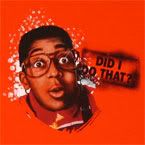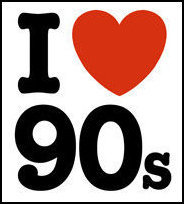
With the classics, there's a general sense of "if-it-ain't-broke-don't-fix-it"-ness. While Warner Brothers animation studios had spent many years continually rehashing and re-spinning the adventures of their classic characters, by the 90s the ol' Looney Tunes gang was getting a bit tired. Under the guidance of Steven Spielberg, the studio was at last poised to create some younger, hipper characters.
Not everyone was particularly keen on disrupting the holy gospel of animated TV. Many adult who had grown up with the original characters were less than thrilled by their 90s incarnations. Regardless, Warner Brothers was finally ready to provide 90s children with some well-deserved original animation in the form of Tiny Toon Adventures, a new show that maintained a similar format to the original Looney Tunes program.
In the spirit of the day, classic cartoons (or near-miss versions of them) were getting a bit of an age downgrade with their 90s makeovers. While many of the shows that entertained our parents featured adult-age characters, animators saw fit to bring their 90s counterparts a bit further down to our level. Chronologically speaking, that is. Newer animated exploits like Flintstone Kids and Muppet Babies explored familiar territory and characters but featured younger versions of the characters we knew and loved.

Tiny Toons was somewhat exceptional in that it introduced (gasp!) new characters. I know, I know. I'll give you a minute to digest it. While most of us out here probably aren't real animation fiends, this was pretty big news from our friends at Warner Brothers. Though their original cartoons continued to air in rerun, they sought fit to shift to a new generation of Looney Tunes christened as Tiny Toons.
With some classic cartoon writers on board, Warner Brothers set out to create a junior class of Looney Tunes. Though not necessarily genetically tied to their predecessors, Tiny Toons were a sort of adolescent version of the originals. They were still pulling the same slapstick humor gags as their forebunnies and foreducks, but this time around they were kids. Students, to be precise. At the esteemed Acme Looniversity. Get it? Looniversity? You're laughing already.
They wrapped it all up in a well-animated colorful package and even threw in a catchy theme song to boot. You know, memory is a funny thing. I don't think I could tell you what a periodic table looks like or how to reduce fractions, but I can can flawlessly recall these lyrics without skipping a beat. Then again, I suppose an anvil never fell from the sky during any of my chemistry classes. It would certainly make it more memorable.
The new show didn't fully abandon our original Looney Tunes heroes. Indeed, they had a relatively respected cameo-level role as our young toons' trusty instructors.I suppose that's as literal a metaphor set-up as ever for passing the torch, but it worked. The show paid homage to the original greats without trying to hard to reinstate the Golden Years.
The characters were sort of junior spin-offs of the Looney Tunes, with similar species. Here were some of our new major animated players:
Buster Bunny
A clear take-off of Bugs, Buster is his forebearer's prized pupil at Acme Looniversity. Buster was the everyman (everybunny?) character and usually the leader of the group. Though Buster and Babs both share the last name "Bunny", they constantly remind the audience that there is indeed no relation between the two. Buster was initially voiced by Charlier Adler, who also gave us delightful characters such as Aaah! Real Monsters' Ickis and Ed and Bev Bighead from Rocko's Modern Life. In the words of the rival animation company that shall remain unnamed, it's a small (animated) world after all.
Though a tad more vulnerable than the infallibly cool Bugs, Buster was certainly in the realm of cool cartoon characters. Observe, his guide to goofing off:
Babs Bunny
Babs was always my favorite, not just because she was female but mainly because she was willing to sacrifice herself for a laugh. She was completely over-the-top. Babs also was queen of spot-on impressions, though it's not especially surprising when you find she was voiced by the talented Tress MacNeille. MacNeille voiced Chip of Chip n' Dale, Dot of Animaniacs, Lindsay Nagle of The Simpsons, and tyrannical Mom on Futurama, among countless others.
Hamton J. Pig
A Porky knockoff, Hamton J. was both studious and compulsively neat. Though you'd think him the straight man, the truth was Tiny Toons rarely played it straight. My favorite part was that there was a cute little menorah in the Pigs' house. For non-MOTs* out there, we're talking Jewish bacon. Hilarious. I promise. It is. Just go with it.
Hamton was voiced by Don Messick, and if you think for a second I'm going to get remotely tired of marveling over all these vocal talents then you've got another thing coming. Probably an anvil. Messick was a cartoon voice all-star, boasting credits as Scooby Doo, Papa Smurf, Bamm Bamm, and Boo Boo Bear.
Plucky Duck
Our Daffy lite, Plucky was a scheming little bill-face. He was Hamton's best friend, though he often took advantage of his kinder nature. I was always a big fan of Plucky's tank top. As far as animated clothing choices go, I always found it somewhat humorous. Plucky was voiced by Joe Alaskey, a guy who made a living impersonating the original Looney Tunes in more recent ventures. He did a mean Bugs, Tweety, Yosemite Sam, and most notable, Daffy.
Montana Max
Montana was our classic bully, and among the few humans to popular Acme Acres. A protege of Yosemite Sam, Montana was equally temperamental. His character is incredibly wealthy, making him the big bad rich villain. Montana Max's vocal talent is probably my favorite 90s connection. Montana was voiced by Danny Cooksey, none other than (wait for it) Bobby Budnick on Nickelodeon's Salute Your Shorts.
Elmyra Duff
Elmyra was presumably the female young version of Elmer Fudd, although her intent with animals is slightly off the Fudd path. Elmyra was completely and utterly obsessed with all things fluffy and cute, getting overexcited and unintentionally abusive with each outpouring of unquenchable love. She was famous for saying such frightening things as, "I'm gonna hug you and kiss you and love you forever" right before she nearly hugs the life out of something.
She was generally pretty dim-witted and spoke in baby talk, though she proved to be one of the most enduring Tiny Toons characters with follow-up roles in both Animaniacs and a Pinky and the Brain spin-off. Elmyra was voiced by Cree Summer, who's done a bunch of stuff but who I like to think of mainly as the voice of Suzie on Rugrats. I just love Suzie.
Certainly this doesn't even begin to cover the vast cast of characters that populated Acme Forest, but it's a start. Tiny Toon Adventures ran three full seasons, with a handful of specials thrown in for good measure. The show did however have a long foray into syndication, exposing a range of children throughout the 90s to their animated antics. That's about all, folks. Or in the ever-wise words of Gogo Dodo, it's been surreal! See you next time.
*Members of the tribe











